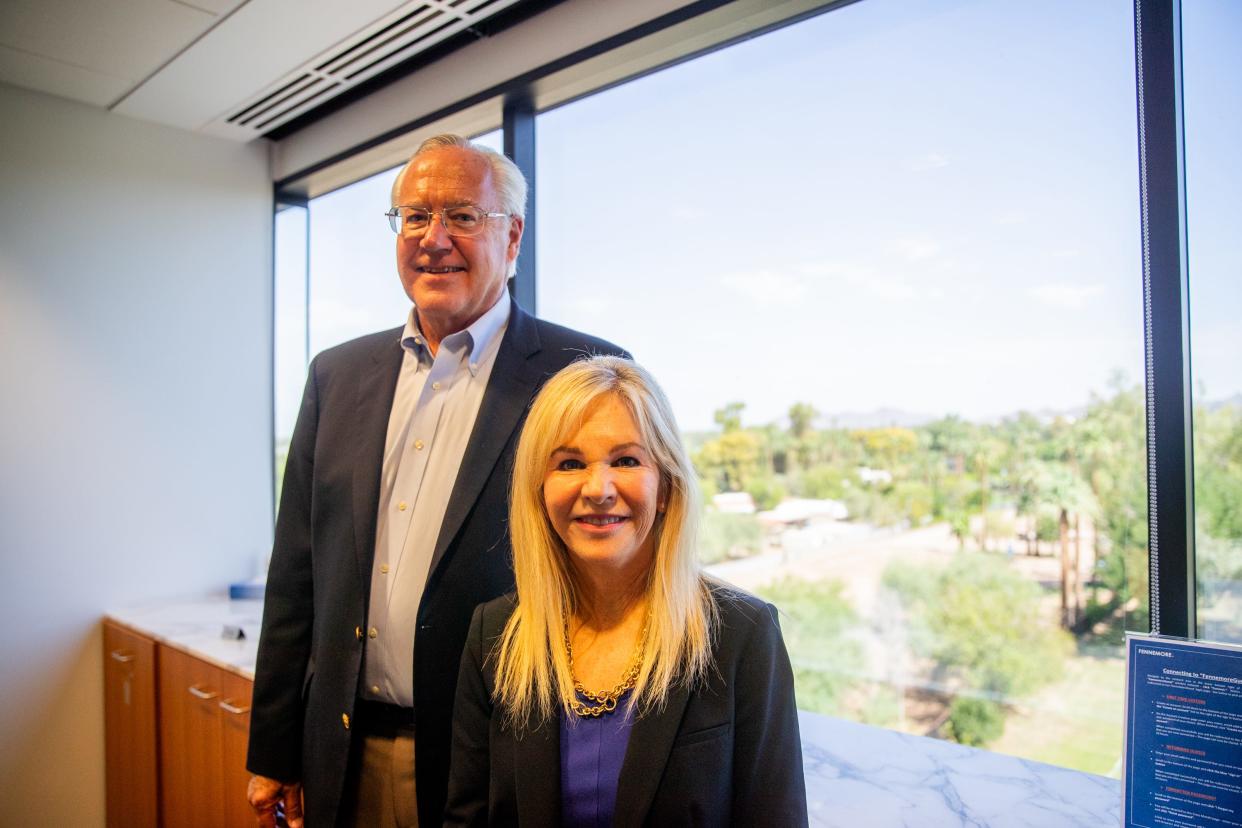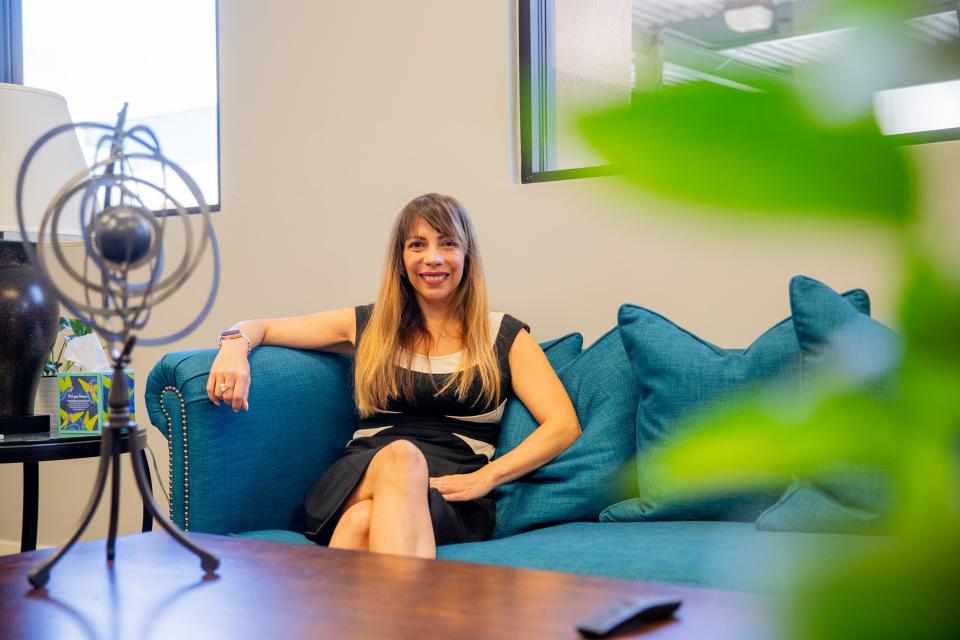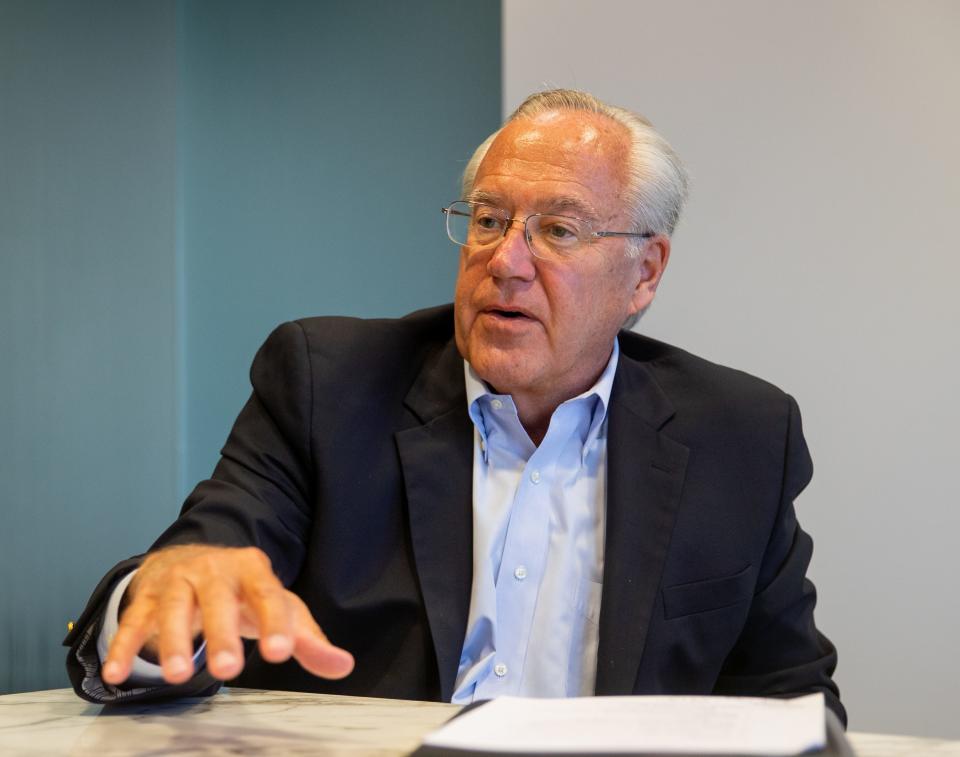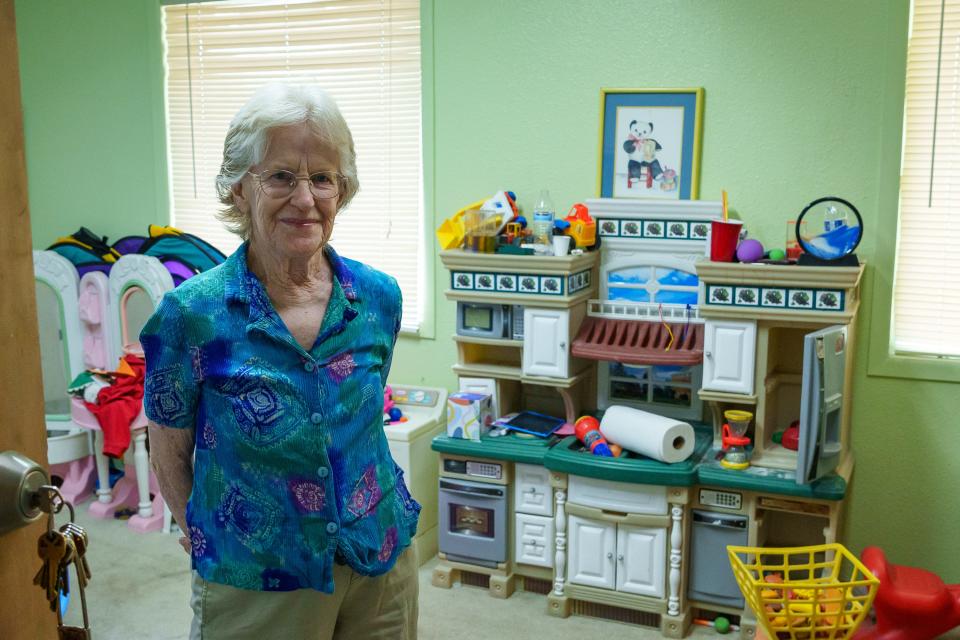Demand for mental health care is up, but many Arizona providers don't take insurance

Dr. Monica Faria, a Scottsdale addiction psychiatrist, wants to spend time with her patients: at least 30 minutes or more per appointment.
In order to do that and to keep her practice afloat, she's opted not to accept health insurance.
"This specialty is based upon creating a safe space and trust between two people, and we need time for that," said Faria, who has also worked in a hospital and in a community health center, where she found she had less time to spend with patients. "You can't do that in 15 minutes. You can barely even get to it, I think, in 30 minutes."
Like many private mental health providers in Arizona, Faria doesn't accept Medicaid, Medicare or any commercial insurance plans. Patients must pay out-of-pocket or find treatment elsewhere.

Mental health providers who opt out of insurance say they have solid reasons for their fee policies. Insurance companies, including the paperwork they entail and the disruptive prior authorizations they often impose, stymie their ability to properly care for patients, they say.
Yet having providers who don't take insurance adds obstacles for patients trying to find mental health care. Depending on the frequency of visits, paying for mental health with no insurance to defray the cost can add up to thousands of dollars per year.
The COVID-19 pandemic, which resulted in heightened attention to mental health and a higher demand for care, has put a spotlight on the significant and persistent barriers to getting mental health treatment. President Joe Biden on July 25 outlined a sweeping plan to improve access to mental health care in the U.S. and said that one of the biggest barriers for patients is cost.
"People with insurance are twice as likely to have to go out-of-network for mental health care compared to physical health care. And that gap has only gotten wider," Biden said at the time. "As a result, folks with depression, anxiety, post-traumatic stress, bipolar disorders, eating disorders, addiction and other illnesses often go without care. Period. And you know how that ends, many times."
Several national surveys and studies have found that in spite of the 2008 federal Mental Health Parity and Addiction Equity Act, Americans seeking mental health care still encounter more roadblocks, including cost, than those seeking care for physical ailments. A March 2022 GAO report found that low reimbursement rates contributed to a lack of willingness among some mental health providers to take patients or to join insurance networks.
"Although approximately 91 percent of the U.S. population is covered by public or private health plans, having such coverage does not guarantee access to mental health services," the GAO report says.
A 2019 report published by Milliman, a health care consulting company, found that in 2017, primary care physicians were reimbursed by insurers between 16.3% and 22.3% more than behavioral health care professionals for the same level of services.
There is not much of an incentive for providers to take insurance if they aren’t guaranteed adequate payment, Mary Giliberti, chief public policy officer for Mental Health America, wrote in a blog post earlier this year.
"A psychiatrist could make more than double from seeing a patient and billing them directly rather than taking Medicare and make three times as much compared to Medicaid," she wrote.
Faria said she'd need to hire another employee, in addition to her practice manager, if she were to contract with insurance companies. She'd also have to see between four and six patients an hour in order to match what she's earning now, she said.
The federal parity law helped elevate the importance of mental health among private insurance providers, but it didn't really do anything to address the root causes of why providers might not contract with insurance companies, and it also didn't mandate payment equity, said Jennifer Snow, national director of government relations and policy for the National Alliance on Mental Illness.
"It more had to do with the coverage that was provided," Snow said. "The reality for people with mental illness is that the parity law doesn't always equal access to care."

Arizona took its own action to give the enforcement of federal insurance parity more teeth in 2020 when then-Arizona Gov. Doug Ducey signed Jake's Law. Jake's Law, which included several other measures to improve mental health care access, was named for Arizona resident Jake Machovsky, who died by suicide on Jan. 11, 2016, at age 15. He took his own life less than three months after an insurance company denied his family's request to extend his inpatient hospitalization for suicidal ideation beyond five days.
Jake's law was a step, "a start," but there are still Arizonans who aren't getting the mental health care they need, said Dr. Don Fowls, a psychiatrist and health care consultant who is chair of the government relations committee for the Arizona Psychiatric Society.
Parity exists on paper, but not in actuality, he said.
'More people are realizing just how challenging it is to find a provider'
Snow said NAMI has a 1-800 helpline and "not a day goes by" without people calling to say they are ready to receive mental health care but can't find a way to get it. The helpline commonly hears from people who can't get in to see anyone because the provider isn't seeing new patients, doesn't accept their insurance, or the provider is in their insurance network but has a waiting list.
"They really then are faced with the reality that they might have to pay out-of-pocket to go out of network to get medical care," Snow said. "Some are going to take on debt in order to do that, and others might just forgo care. And these are really choices no one should have to make."
Exacerbating the problems with finding help that existed before the pandemic is a national shortage of mental health providers that has worsened since 2020.
Chiricahua Community Health Centers Inc. in rural Cochise County has been trying to hire a psychiatrist for six to eight months, with no luck. Valleywise Health in Phoenix has had to close several of its inpatient psychiatric units because of a lack of behavioral health staff. MHC Healthcare in Marana just hired two psychiatrists, but the process took about a year.
"I think with more people experiencing mental health conditions and trying to access care, more people are realizing just how challenging it is to find a provider," Snow said.
Some Arizona providers left the profession or cut back their hours during the pandemic, said Scottsdale mental health consultant Matthew Moody, who is president of the board of directors for Mental Health America Arizona.
"If you want to find a counselor and you don't know anybody, your insurance company gives you a huge list and you have to call them all individually," Moody said. "A lot of them won't even answer the phone. ... If you are depressed and feeling hopeless and you make five phone calls and never get a call back, then guess what, you might just stop and continue to suffer."
Having trouble finding a therapist? A community health center might be able to help
A shortage of mental health providers and escalated patient needs since the pandemic means a provider who doesn't take insurance likely won't have trouble finding patients willing to pay cash, though many providers, including Faria, already were eschewing insurance before the pandemic.
Being free from contracting with insurance companies allows Faria to spend more time speaking with patients and to manage and monitor their medications, she said.
Psychiatric medications can have profound impacts on the nervous system, and it's important to carefully monitor patients for side effects, she said.
Mental health treatment may cost hundreds of dollars per hour
The share of all types of physicians accepting patients is lowest among psychiatrists, with 60% accepting new Medicare patients and 59% accepting new privately insured patients, says a 2022 analysis from KFF, an independent health policy organization.
For both Medicare and private insurance, the share of psychiatrists accepting new patients was at least 20 percentage points lower than the share of physicians in general/family practice accepting new patients, the analysis found.
Psychiatrists are more likely than other specialists to opt out of accepting Medicare, the analysis found. In 2022, 7.5% of U.S. psychiatrists opted out of Medicare, compared with a 1% opt-out rate for all physicians.
Psychiatrists are less likely than primary care physicians and other specialists to accept new patients covered by Medicaid, according to a study published in a 2019 research letter by University of Kentucky researcher Hefei Wen in JAMA Psychiatry. The study found that in a two-year span from 2014 to 2015, 35% of psychiatrists were accepting new Medicaid patients versus 73% of primary care doctors.
Snow, of NAMI, said she's not aware of any up-to-date data on how many psychiatrists in private practice opt out of insurance, but it's an issue her organization regularly hears about. Fowls said he's aware of it happening in Arizona, too.
Fowls said he understands why some providers don't take insurance, but he also sees insurers' perspective. Behavioral health has a history of fraud and abuse, and insurance companies need to maintain checks and balances, he said.
And some psychiatrists charge more money than insurance should pay, he said.
"The insurers don't pay enough, and the paperwork is still a burden. There's a problem there," Fowls said. "But I also know that there's a problem on the provider side. I am a psychiatrist, and there are a lot of good psychiatrists. But there are some who want to make a buck and make a lot of money and who are using psychiatry to make a buck."
Costs of direct-pay psychiatric services vary, and some providers will offer a sliding fee scale, but it can be hundreds of dollars an hour. One Scottsdale practice, which has five psychiatrists on staff, as of Aug. 4 charged $750 for a 90-minute initial child psychiatry consultation, $415 for a 50-minute follow-up, and $250 for a 30-minute follow-up, its website said.
Psychologists and licensed therapists are typically cheaper than psychiatrists, though an individual session can still exceed $100, which is a barrier for some patients. Some practices say they will offer patients a "superbill," which is an invoice for the treatment that patients may submit to their insurers for out-of-network reimbursement, but it's not a guarantee that insurance companies will grant the out-of-network coverage.
Mental health practices that don't accept insurance sometimes offer explanations on their websites.
"I love spending quality time with my patients and insurance won't allow me to do that." says the website of Tucson psychiatrist Dr. Lisa Goldman, who did not return a phone message or email from The Arizona Republic.
Phoenix psychologist Betsy Gilpin, who has been practicing since 1982, said prospective patients who call her independent practice are often relieved to find out that she does accept insurance and that she's taking new patients. Gilpin has never considered opting out of taking insurance because she wants to provide care that's affordable to her patients, who include many young families and older people on Medicare who don't have a lot of disposable income, she said.

Gilpin said she understands why some providers don't take insurance as it can be time-consuming and "a lot of hassles" are involved. But she also sees the benefits of insurance because it can make therapy affordable for people who need it.
Gilpin emphasized that getting mental health care, even with insurance coverage, is a huge financial stretch for some of her patients. Patients are facing higher out-of-pocket expenses than in the past because of a trend in health insurance plans toward higher annual deductibles and higher co-payments.
Most AZ counties don't have psychiatrists for adolescents
Psychiatrists are in short supply across the U.S. Arizona's ratio of psychiatrists per resident is worse than the national average, and Fowls said the shortage has a "pretty profound effect" on residents.
The state has 947 active psychiatrists for a population of 7.3 million people, and national studies indicate the profession will undergo a wave of retirements in the next decade or so.
Psychiatrists see the most complex, acute mental health patients, some of whom, if left untreated, end up homeless, in the criminal justice system or in psychiatric hospitals.
Not everyone with a mental health problem needs a psychiatrist. Sometimes a licensed therapist, primary care doctor or a psychiatric nurse practitioner is equipped to do the job. For other patients, a psychiatrist is critical, Fowls said. For a patient who is hallucinating or hearing voices, psychiatrists can assess whether there's a serious mental illness or another problem that's causing the psychosis, including a medical problem like hyperthyroidism, illicit drugs or a drug interaction.
"There is no one else equipped to assess that type of patient but a psychiatrist," Fowls said. "The other specialties can't. The non-MD therapists can't, because they don't have the medical training. That's where I think it really hits."
Arizona has 175 child and adolescent psychiatrists, which translates to a rate of 11 per 100,000 kids. That's below the national level of 14 per 100,000 kids, according to workforce maps maintained by the American Academy of Child & Adolescent Psychiatry. Nine Arizona counties don't have any child and adolescent psychiatrists, the academy's data says.
"It's not for all kids," Fowls said of the specialty. "Where they are really important are for really tough kids where it's hard to know what's going on, or it's really hard to treat. Autism is a great example."
Figuring out whether a child has autism is not something that an average psychiatrist or primary care doctor is going to be able to diagnose, he said. Child and adolescent psychiatrists are crucial in providing assessments and also in determining medication needs, according to Fowls.
Biden's plan for mental health could broaden access
It remains to be seen whether Biden's efforts will alter the unwillingness of some providers to deal with insurance companies, but his plan could incentivize insurers to reimburse mental health providers at higher rates. The plan proposes new updates to the regulations that implement the 2008 parity law.
Among other measures, his proposal would require insurance companies to prove their networks are robust enough to ensure access to mental health care, said Snow, the national director of government relations at NAMI.
"In order for insurance companies to able to prove that, I think in many cases they're going to have to look at their networks and get more providers to participate in the networks," Snow said. "And one strategy that could get more providers to participate is increasing the rates that they'll offer the providers."
After Biden announced his mental health plan, a trade association of U.S. health insurance companies issued a statement that says mental health continues to be a significant challenge, primarily because of a shortage of clinicians. The statement also says insurers have already been making efforts to expand mental health networks and to find new coverage pathways, including telehealth.
"As we evaluate these significant new proposals, we want to reiterate and make clear: mental health is good health, period," says the statement issued by AHIP, formerly known as America's Health Insurance Plans. "We agree that everyone deserves access to mental health care, and that access should be on par with physical health."
In the meantime, there are some lesser-known options for people who need help, including getting mental health care at one of Arizona's federally qualified health centers, which are rapidly growing their mental health services. Some of them have therapy and psychiatric care.
Arizonans who find themselves frustrated in a search for mental health care should be persistent and know that they are not alone, said Moody of Mental Health America's Arizona chapter, who added that one of his goals is to expand the chapter's navigation program that helps people in the community to find providers.
Biden's proposal is good, but it's going to take more work and collaborations at a state and local level to make meaningful improvements to mental health care access, Fowls said.
Research indicates mental health providers are not getting paid on par with other areas of health care, so that is a place to start, he said.
Free mental health resources are available to anyone in Arizona. A statewide mental health crisis line is available at 844-534-HOPE (4673). Another resource for 24/7 help is to dial 988. The 988 Suicide and Crisis Lifeline in July 2022 replaced the National Suicide Prevention Lifeline. Teen Lifeline is for kids to call and get free, confidential and anonymous help from trained peers at 602-248-8336 (TEEN) or 800-248-8336 (TEEN) outside of Maricopa County.
Reach health care reporter Stephanie Innes at Stephanie.Innes@gannett.com or at 602-444-8369. Follow her on X, formerly Twitter: @stephanieinnes.
This article originally appeared on Arizona Republic: Why so many Arizona mental health providers don't take insurance

